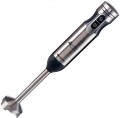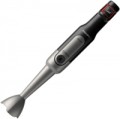Main bowl
The volume of the main bowl supplied with the device.
For more information about the main bowl, see "Capacities". And the amount of product that can be loaded into the device at a time directly depends on its volume. On the other hand, a capacious bowl has the appropriate dimensions and cost, and also puts forward increased requirements for engine power. Therefore, you should choose according to this parameter, taking into account real needs. And also you should consider that for stand mixers with a bowl, in most cases, the volume means the total size, and not the useful one. The bowl must be filled less than 2/3 during cooking (here it is already individual and you need to look at the instructions for the product).
Grinding bowl
The working volume of the grinding bowl, supplied with the device.
For more information about the bowl for grinding, see "Capacities". And the amount of product that can be grinded in the device in one load directly depends on its volume. At the same time, keep in mind that a larger bowl takes up more space, costs more, and also requires a more powerful engine. Therefore, manufacturers usually select this volume taking into account the overall level and performance of the device.
Shaker volume
The working volume of the shaker supplied with the device.
For more information about such containers, see "Shaker (travel bowl)". And on the one hand, the actual capacity of the shaker directly depends on the volume, on the other hand, its dimensions, as well as the requirements for engine power. However, in most models, this indicator ranges from 300 to 700 mL, less often up to 1 liter — these values are considered optimal, taking into account the specifics of the use of shakers.
Power
The rated power of the device, in fact, is the power of the engine installed in it.
The higher this indicator, the more performant this model is, the more suitable for “heavy” work and the more applications can be provided in the design. For example, in the case of mixers (see “Appliance type”), a power of up to 250 W is considered good for liquid products; for more solid tasks, like kneading tough dough, you should pay attention to more powerful models. Detailed recommendations on optimal power can be found in special sources.
Note that powerful devices are usually equipped with more durable nozzles that can withstand high loads.
Number of speeds
The number of speeds of rotation of the nozzles provided in the mixer / blender.
The presence of several speeds allows you to adjust the operating mode of the device to a particular situation. For example, a liquid omelet can be whipped at high speed, but it is better to choose a slower mode for kneading dough. The more speeds provided in the device, the more versatile it is, the more accurately it can be configured for a specific task. In simple household models, from 3 to 6 settings are usually provided, in the most advanced devices their number can reach two dozen.
One button control
Models of blenders, the control of which is reduced to
one button, and the speed of work depends on the force of pressing. This solution allows you to work with one hand and change the operating modes with the same hand, while the other can fill up the ingredients and not stop the process.
Turbo mode
Turbo mode allows you to significantly increase the speed of rotation of the mixer nozzles for a short time. In this way, unevenness in the whipped product can be quickly and efficiently eliminated, which is especially valuable at the end of whipping. However, note that the turbo mode can only be turned on for a short time, otherwise there is a risk of overheating of the motor.
Capacities
Types of capacities that the device was originally equipped with.
In addition to
the main bowl, the package may include
a bowl for chopping,
a coffee grinder,
a measuring cup and a
travel shaker bowl. All of them are described in detail in this list, with the exception of the shaker — see a separate paragraph below about it.
— Main bowl. The main capacity of an appliance is called the general purpose bowl, and its design varies depending on the type of device. It can be a deep bowl for stand mixers, a jug with knives at the bottom for countertop blenders, or a chopper jar with removable knives for hand blenders and choppers. However, not all appliances come with a main bowl, and in some cases, users are expected to choose their own container.
— Bowl for chopping. Capacity with removable knives is an essential component for chopping products. This container is typically referred to as a grinding bowl, and when it's included in a grinder's delivery set, it's considered the main bowl. However, some devices have a grinding bowl as the main bowl, and knives are a necessary part of its structure.
— Grinder (for coffee). The coffee grinder container is specifically designed for grinding coffee, nuts, spices, sugar, and other products. It usually contains knives similar to th
...ose in blenders, but is distinguishable from the main blender container due to its much smaller volume.
— Measuring cup. The measuring capacity is a transparent glass with a scale that enables the user to measure specific volumes of liquid and bulk products. The accuracy of the scale may vary, but for regular use, it's typically sufficient.Shaker (travel bowl)
The number of travel shaker bowls supplied with the appliance.
These bowls are supplied exclusively with blenders of different types (see "Type of device"). A shaker is a capacity, most often in the form of a tall glass, which can be removed from the device, tightly closed and carried with you without fear of pouring the contents. In such capacities, two lids are usually used: a working lid with chopping knives (a bowl with such a lid is placed on the blender with the bottom up), and a “travel” lid, which can be equipped with a valve for easy drinking. Shakers are very popular among smoothie lovers: they allow you to prepare your favorite drink and take it with you without fiddling with pouring from a bowl to another capacity.

